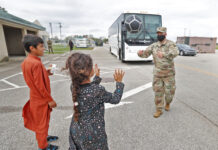JOHANNESBURG — South Africa’s army began deploying 25,000 troops Thursday to assist police in quelling weeklong riots sparked by the imprisonment of former President Jacob Zuma. At least 117 people have been killed in the violence, authorities said.
In one of the largest deployments of soldiers since the end of white minority rule in 1994, the government said 10,000 soldiers were on the streets by Thursday morning and the South African National Defence Force has also called up all of its reserve force of 12,000 troops.
In a show of force, a convoy of more than a dozen armored personnel carriers brought soldiers Thursday into Gauteng province, South Africa’s most populous, which includes the largest city, Johannesburg, and the capital, Pretoria.
Buses, trucks, airplanes and helicopters were also being used to move the large deployment of troops to trouble spots in Gauteng and KwaZulu-Natal province that have seen a week of violence in mainly poor areas.
The violence erupted last week after Zuma began serving a 15-month sentence for contempt of court for refusing to comply with a court order to testify at a state-backed inquiry investigating allegations of corruption while he was president from 2009 to 2018.
The protests in Gauteng and KwaZulu-Natal escalated into a spree of theft in township areas, although it has not spread to South Africa’s seven other provinces, where police are on alert.
More than 2,200 people have been arrested for theft and vandalism and 117 have died, Khumbudzo Ntshavheni, acting minister in the presidency said Thursday. Many of those killed were trampled in chaotic stampedes when shops were being looted, according to police.
The armed patrols have brought stability to Gauteng, South Africa’s most populous province, which includes Johannesburg, the country’s largest city. Army troops stood guard at the large Maponya mall in Soweto, which was one of the few retail centers not badly hit by the rampaging but remained closed.
Volunteer groups cleaned up shattered glass and debris from shops that had been stormed and looted in Johannesburg’s Soweto, Alexandra and Vosloorus areas.
“I spoke to some of the guys who are unemployed in my area to come and help. The mayor supported us with transport to get here. We came here with two buses,” said George Moswetsa, a resident of Vosloorus in eastern Johannesburg who was helping to clean up a mall that had been trashed.
The unrest, however, continued Thursday in KwaZulu-Natal, Zuma’s home province. There were renewed attacks on shopping centers and several factories and warehouses were smoldering after being hit by arson attacks.
Army and police worked to reopen the N3 toll highway, which had been closed for days as burned-out trucks blocked the roads. The highway is an important transport route carrying fuel, food and other goods to all parts of the country and its prolonged closure is expected to cause shortages of essential goods.
Armed security has been established around Durban harbor, southern Africa’s largest port, to make sure that it is able to continue operating.
Police discovered more than 10,000 rounds of ammunition in Durban on Wednesday night, which Minister of Police Bheki Cele said belonged to people who were instigating the violent riots in the province.
Security forces increased their presence in the Durban suburb of Phoenix, where the riots caused racial tensions to flare. The predominantly Indian residents of Phoenix had been patrolling their area against the unrest and are accused of shooting Black people suspected of being rioters.
“Lives have been lost. The communities have a stand-off and are in a bad way because it is the Indian community and the neighboring communities, who are African,” Cele told a news conference Thursday in Phoenix, where he said 15 people had been killed.
Cele had earlier said that about 12 people were being investigated for inciting and planning the unrest.
The largest deployment of soldiers since South Africa won democracy was in March 2020 when 70,000 army troops were sent out to enforce the country’s strict lockdown to combat the spread of COVID-19, Ntshavheni, said Thursday.
This story has been corrected to show that this one of the largest deployments of troops in South Africa, not the largest.



